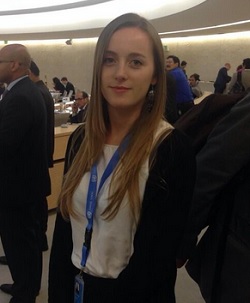On 19 June, Bahrain Institute for Rights and Democracy’s Advocacy Associate, Amanda Milani, delivered an oral intervention (1:53:40) at the 26th Session of the United Nations Human Rights Council in Geneva under Item 3 on the situation of trafficking persons and migrant workers in the Gulf Cooperation Council states of Bahrain, Qatar and Saudi Arabia. Please continue reading for full remarks or click here to download a PDF.
Veuillez cliquer ici pour lire cette déclaration en français.
الرجاء الضغط هنا لقراءة هذه الرسالة باللغة العربي
###
Mr. President,
Alsalam Foundation, together with Americans for Democracy and Human Rights in Bahrain and the Bahrain Institute for Rights and Democracy, would like to call the Council’s attention to the status of the human rights of trafficked persons and migrant workers in the GCC States of Bahrain, Qatar, and Saudi Arabia. These States have failed to protect the human and economic rights of migrant persons within their borders.
The majority of the thousands of individuals trafficked into these countries each year are victimized by the kafala system—an employment system that removes from migrant workers the ability to leave abusive employers. In Qatar and Saudi Arabia, it is illegal for a migrant worker to leave their employer without first obtaining that employer’s permission; in Bahrain, workers must wait at least one year before seeking permission from the government to change or leave employers. As a result, domestic workers cannot legitimately leave the employment of persons that torture them, and construction workers cannot legally change employers when they are forced to work for 10 hours in 42 degree weather.
The previous Special Rapporteur on trafficking in persons, Rapporteur Huda, visited Bahrain and Qatar in 2006. In her report, Rapporteur Huda issued a series of recommendations designed to fix the human trafficking issues in the countries. In a report released on Tuesday, ADHRB documented that those recommendations, which included dismantling the kafala system, remain unimplemented in the seven years since Rapporteur Huda’s visits. These findings were largely confirmed by the Rapporteur on Migrants Rights during his visit to Qatar. A follow-up visit from the Rapporteur on Trafficking is necessary in order to ensure that the human rights of migrants and trafficked persons receive the attention that they so urgently require.
On the occasion of the 26th Session of the Human Rights Council, we ask the Special Rapporteur to renew her focus on the cause of human trafficking in the GCC by formally requesting follow-up visits with the States of Bahrain and Qatar and by renewing the request that the mandate made to visit Saudi Arabia in 2005.
Thank you.





